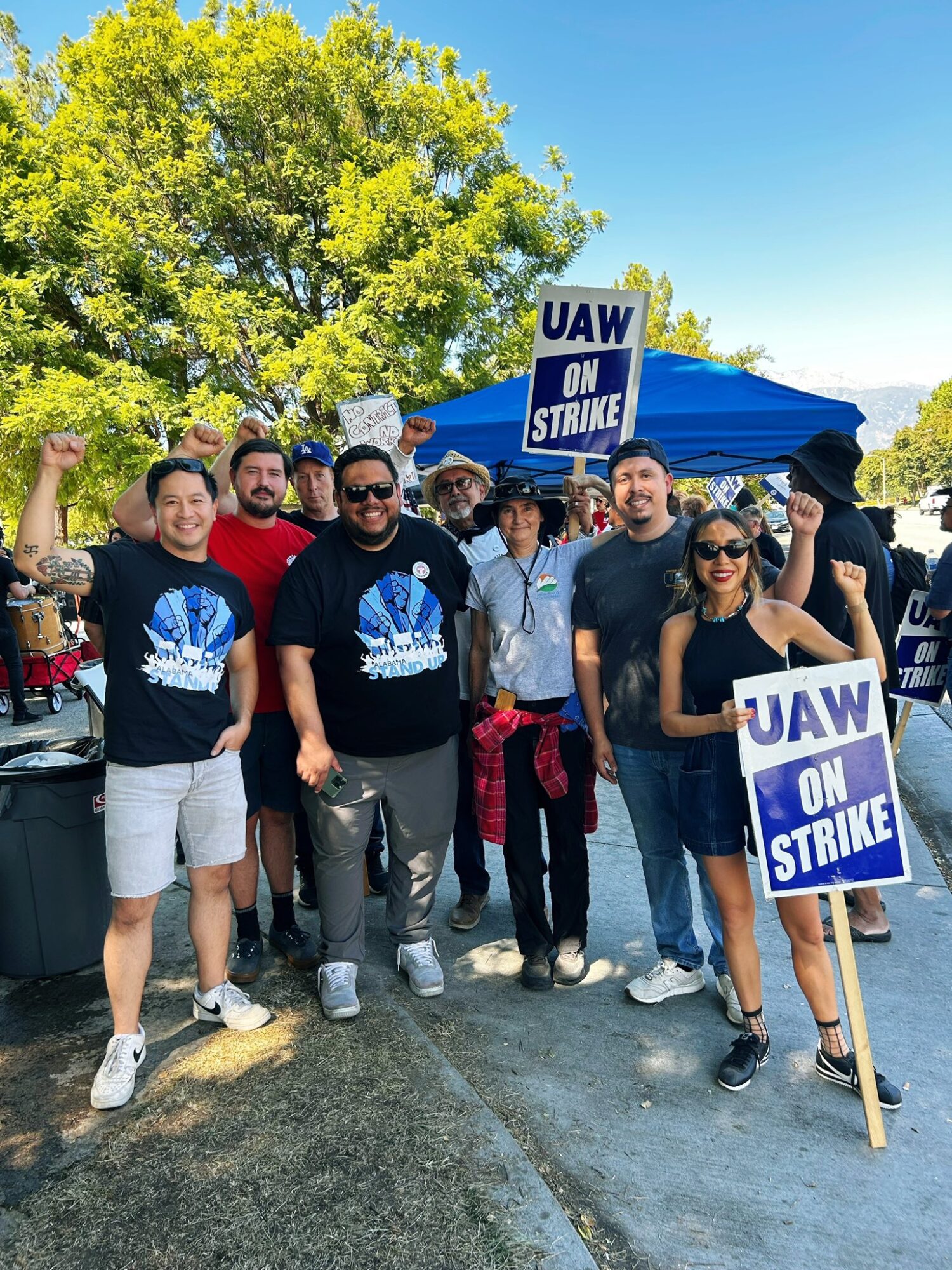UAW Is Fighting for a Truly Just EV Transition
By Erika Thi Patterson

“No deals, no wheels, no automobiles!” sang the live cumbias band performing the soundtrack to our march on the United Auto Workers (UAW) picket line outside of a Stellantis plant in Rancho Cucamonga, Calif. In early October, Public Citizen, Labor Network for Sustainability, Mighty Earth, and other climate groups joined dozens of picket lines in solidarity with the UAW as they marched to demand a just electric vehicle (EV) transition and fair contract with the “Big 3” automakers–Ford, General Motors, and Stellantis.
Show up for auto workers today by joining an active picket line or organizing a leafletting action at a Big 3 dealership!
Auto workers are rightfully demanding that the transition to EVs will not further exploit workers or leave them behind. For decades, U.S. automakers have shifted operations from the midwest to southern states, where weaker labor protections and vicious anti-union campaigns have undermined auto workers’ efforts to unionize.
Now, automakers are benefitting from billions of dollars in tax incentives and subsidies provided by the Inflation Reduction Act (IRA) to accelerate the EV transition and are using these funds to continue remaking an auto sector in which the vast majority of jobs are low-wage, unsafe, non-union, and reliant upon temporary workers who receive the least pay and no benefits. On top of all this, as climate advocates urged policymakers to enact legislation to accelerate the EV transition, the Big 3 have poured millions of dollars into lobbying to delay the EV transition at the expense of the planet, public health, and worker job quality.
The outcome of the UAW strike and the future of the EV industry will have an outsized impact on Black workers. Black workers played a crucial role in securing the wages, benefits, and protections UAW fought for 50 years ago, and black workers have long relied on union auto jobs as a pathway to financial stability in the U.S. Today, the percentage of Black workers in the auto industry is more than double the share in the workforce overall. Automakers’ efforts to use the EV transition to undercut the standards UAW won decades ago have hit Black workers hardest, as many have seen auto work shift from being a stable career to little more than a low-wage job.
Recognizing the climate, economic, and racial justice implications of the strike, more than 130 climate, environmental, and civil society organizations from across the country called on Ford, GM, and Stellantis to meet auto workers’ demands. The EV transition cannot happen without workers, and we know that green jobs must also be good union jobs. UAW’s demands are a roadmap toward a just transition for not only the auto sector, but the entire auto supply chain, which has historically been rife with environmental, human rights, and labor abuses. Over the last decade, profits at the Big 3 have skyrocketed 92%, and CEO pay has jumped up by 40%. Meanwhile, workers’ wages have fallen significantly behind inflation.
The UAW is also fighting to ensure workers in the EV supply chain get a fair share of these gains by demanding that the Big 3’s battery plants be covered under the national union contracts. This would radically change conditions for workers in the fast-emerging battery supply chain, as most battery workers currently earn just above minimum wage and enjoy only a fraction of the benefits covered by UAW contracts.
GM recently agreed workers at their electric battery manufacturing operations will be covered under the UAW‘s National Master Agreement. In the near term, the deal means the 720 workers at GM’s Ultium battery plant will see their wages, benefits, and job quality improve significantly. And over time, as GM invests in more battery plants, thousands of new workers in those yet-to-be-built plants could ultimately be covered by the national contract.
This historic win sets a new precedent for other automakers, adding pressure on Ford and Stellantis to follow in GM’s footsteps. Globally, UAW’s push on Big 3 to raise standards for battery production is a crucial intervention that lays the groundwork for improving labor and environmental conditions for workers and communities along other parts of the supply chain, like sourcing of minerals. Automakers have the power and responsibility to address supply chain harms and risks, and they must conduct due diligence to ensure their suppliers are operating in a manner that protects local communities and workers and minimizes climate and environmental harms.
For our climate and our public health, we must transition to using only zero-emission vehicles. But that transition cannot leave workers behind, and automakers must address long-standing risks in their auto supply chains that are opening the door for human rights abuses and environmental injustices.
This is one of the many reasons the climate movement must stand firmly with UAW members in their fight for a truly just transition to EVs for auto workers and auto supply chain workers.
Join us in solidarity with autoworkers today by heading to an active picket line or by planning a leafletting action at a Big 3 dealership in your community!